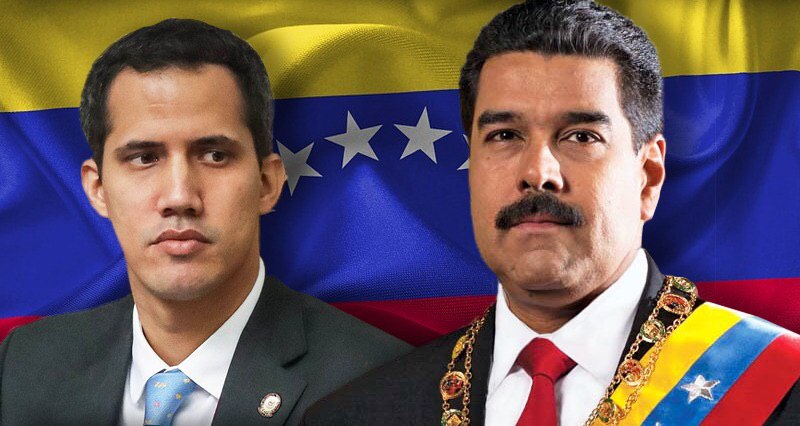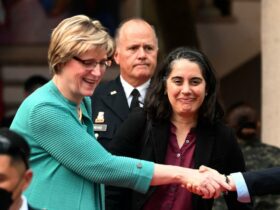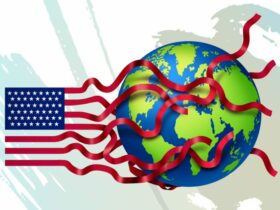A coup is underway in Venezuela. On January 23, Juan Guaido, the speaker of the National Assembly, announced himself to be the president of the country at a demonstration in Caracas. The United States, Canada and seven Latin American States immediately recognized the new “president.” Venezuelan President Nicolas Maduro announced that the United States was behind the coup on Wednesday. Venezuelan authorities responded by breaking off all diplomatic and political relations with the United States, declaring Guaido’s claim to power unconstitutional.
“Venezuela has the right to sovereignty and can manage its administration. We will defend the people’s right to peace, ” Maduro emphasized.
The context of the coup
On January 21, a group of National Guard soldiers sharing an anti-Maduro political agenda attacked a military post, seized weapons and moved on to Caracas. In the region of San José de Cotis, they were blocked by forces loyal to Maduro who disarmed the rebels. The rebels managed to record a video-appeal which they published on youtube calling for revolution.
On January 23, the 61st anniversary of the end of the Perez Jimenez dictatorship was celebrated in Venezuela. In 1958, opposition parties with the support of the army overthrew the country’s president, General Marcos Perez Jimenez, and restored representative democracy in the republic. This year, the opposition planned mass actions to commemorate the day. The opposition led thousands of supporters to the streets. Protests against the government were held in Caracas, Valencia, Barkicimento, Maracay and San Cristobal. The four richest regions of the country made up the majority of the opposition’s protests in Caracas – Barinas, Aragua, Bolivar and Nueva Esparta.
The situation was thus already heated before Guaido’s assumption of power. Both Guaido and Maduro have appealed to the armed forces claiming to be the “legitimate authority”.
Maduro, despite the horrific economic situation in the country and the crisis of “Bolivarian socialism”, has a solid number of supporters, who consider US provocation and economic sanctions to be the source of the crisis.
The National Assembly’ claims there is a legal basis for supporting Guaido’s self-proclaimed presidency:
– the elections of May 20, 2018, in which Nicolas Maduro was re-elected for a new term, were conducted illegally
– the elections were tainted by low turnout and allegations of voter fraud
– the winner of elections, Nicolas Maduro, was removed from the presidency by a majority of parliamentarians in 2017
The opposition declared that, according to the Constitution, the president should be the speaker of the National Assembly – Juan Guaido. Guaido is defining himself as a representative of the right-wing front. He is certainly not, however, the most popular politician in the country. He hasn’t won in gubernatorial elections or run a successful presidential election campaign. Essentially, his only political experience was his election to the National Assembly in 2015.
Maduro’s front
Maduro’s supporters, including the judges of the Supreme Court, argue that the actions of the National Assembly are illegal. They have suspended the National Assembly’s authority in response.
Numerous countries around the world also declared their support for the Bolivarian socialist government.
Turkish President Recep Tayyip Erdogan, despite representing a NATO government, expressed words of strong support for Maduro, even making a personal call to the leader.
“Maduro brother, stand tall, Turkey stands with you” Erdogan allegedly said in during the phone call. ”Turkey, under the leadership of its leader, will defend its principled position against attempted coups” Ibrahim Kalin, a spokesman for the Turkish Presidential office, added.
Cumhurbaşkanımız, Venezuela Devlet Başkanı Nicolas Maduro’yu arayarak Türkiye’nin desteğini ifade etti ve “Maduro kardeşim! Dik dur, yanındayız” dedi.
Türkiye, CB’mız Erdoğan’ın liderliğinde bütün darbe girişimlerine karşı ilkeli duruşunu koruyacaktır. #WeAreMADURO— Ibrahim Kalin (@ikalin1) January 23, 2019
Mexican Foreign Minister Roberto Velasco stated that Mexico City recognizes Maduro as the legitimate head of Venezuela.
“Cuba’s firm support and solidarity to constitutional President Nicolas Maduro amid a coup attempt. The sovereign will of the people of Venezuela will triumph over imperialist intervention. History will condemn those who encourage and recognize the illegal putsch seizure, ”said Cuban Foreign Minister Bruno Rodriguez, in turn.
Russian authorities also extended support. China declared their opposition to foreign intervention and Venezuela’s right to defend its sovereignty.
Forecast
Venezuela has a long and fraught history of military coups. Recall the fact, that Chavez began his ascent to the presidency with an unsuccessful attempt to overthrow the country’s leadership by armed coup d’état. The events of January 21 showed that the armed forces are not all loyal to Maduro. There is reason to assume that there are also many dissatisfied among the ruling elite of the country, even within the pro-presidential United Socialist Party of Venezuela (PSUV).
US financial and diplomatic support will significantly strengthen the position of the opposition forces.
It cannot be excluded that the conflict will lead to armed foreign intervention. While direct military intervention by the US seems unlikely, there is a strong possibility that Colombia will intervene. In 2015, the countries were essentially on the verge of war. Maduro is accused of supporting militant leftist groups engaged in guerilla warfare against the Colombian government. Maduro has made the same accusation against Colombia in regard to far-right “paramilitaries” in Venezuela.
The continued economic attacks against the country including crippling sanctions will undoubtedly continue to provide a basis for discontent within the country.















Leave a Reply